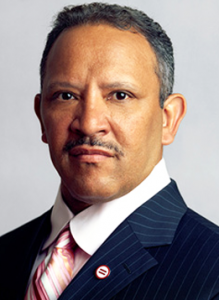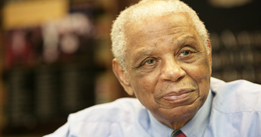
By Mark Morial
Guest Column
We lost Judge Damon J. Keith, one of the greatest champions of voting rights in American history. More on his legacy.
“By denying the most vulnerable the right to vote, the Majority shuts minorities out of our political process. Rather than honor the men and women whose murdered lives opened the doors of our democracy and secured our right to vote, the Majority has abandoned this court’s standard of review in order to conceal the votes of the most defenseless behind the dangerous veneers of factual findings lacking support and legal standards lacking precedent. I am deeply saddened and distraught by the court’s deliberate decision to reverse the progress of history. I dissent.”
– Judge Damon J. Keith, dissenting in the 6th Circuit Court of Appeals decision on Northeast Ohio Coalition, et al. v. Husted, et al
As the National Urban League prepares to release the 2019 State of Black America ® — focused for the first time on the state of the Black vote – we mourn one of the greatest champions of voting rights in American history: Judge Damon J. Keith. Keith, the grandson of former slaves, was Judge of the U.S. Court of Appeals for the Sixth Circuit and a former Judge of the U.S. District Court for the Eastern District of Michigan. He died this week at the age of 96.
His extraordinary career included the desegregation of public schools in Pontiac, Michigan, establishing affirmative action in police departments, and halting President Richard Nixon’s illegal wiretap program. Following his desegregation order, Judge Keith received death threats and 10 Pontiac school buses were firebombed by Ku Klux Klansmen.

His dissent in NEOCH v. Husted, which upheld Ohio’s draconian voting restrictions on early in-person and absentee voting, included a photo gallery of voting rights martyrs. “I wanted to dramatize the racist attitude of the majority,” he told a reporter shortly after the decision. “Look at those pictures. These are men and women who died for the right to vote. I was really so hurt by the decision of the majority of the court. My grandparents lived in Georgia, and they were not allowed to vote because of racism.
I thought about them.” Judge Keith was born in Detroit, the son parents who were part of the Great Migration from Georgia. His father worked for $5 a day in a Ford Motor plant. He served in the segregated U.S. Army during World War II, working mainly at kitchen duties, and was discharged as a sergeant. While studying the law, he worked as a janitor at a newspaper, where a white reporter told him “keep mopping,” rather than strive for a legal career.
He earned his law degree at Howard University, where future Supreme Court Justice Thurgood Marshall was a mentor. “He used to tell us to remember those four words engraved on the Supreme Court: Equal justice under law,” Judge Keith said of Justice Marshall. “He’d say, ‘The white man wrote those letters on the Supreme Court. Now use those words to make equal justice under law a reality.’ Thurgood also used to tell us: ‘Use the law as a means of social change.’
I tried to do that throughout my judicial career.” We in the National Urban League join his family and friends in mourning his passing. His landmark decisions reflect the highest ideals of the equitable, honorable nation we strive to be. His life and work stand as an example of dignity, integrity, and determination. As a civil rights organization, we strive to uphold his legacy.
Marc Morial is president/CEO of the National Urban League.
